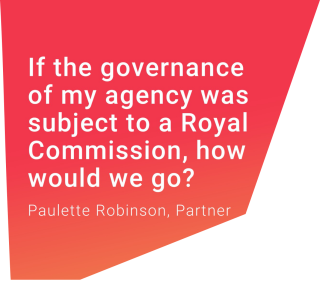If the governance of my agency was subject to a Royal Commission, how would we go?

The Royal Commission into Misconduct in the Banking, Superannuation and Financial Services Industry was a reminder to all Australian Public Service (APS) leaders that it is not enough to have a governance framework in place, it must be seen to be, and in fact must be, effective.
The question for all APS leaders is ‘if my agency was subject to the scrutiny of a Royal Commission, how would we go?’ This represents a benchmark where the evidence required far exceeds those of the ‘front page of the newspaper test’, or more recently the ‘pub test’, that is so often applied across the APS as the way to pressure test the consequences of decision making.
Public confidence and trust are key for all Commonwealth activity; therefore, systems of good governance and accountability are key.
Governance is active, not passive
Speaking recently at the Australian Financial Review Banking and Wealth Summit, AMP Chairman David Murray warned: “We’re starting to lose sight of what culture is about, and we can’t solve problems starting with culture, we solve problems starting with systems.” The systems of governance are likely to be subjected to scrutiny first.
A Partner at Synergy, Paulette Robinson, says that while good governance practices have always been in place in the APS, the advent of The Public Governance, Performance and Accountability Act (PGPA Act) was critical. “It provides APS agencies with all the tools necessary to consistently align strategy, governance, performance, monitoring and reporting. To avoid the failings found in financial sector they need to make sure all the elements are effectively working together.”
In her work across the APS assisting agencies to implement frameworks of governance and organisational performance, Robinson sees two main areas where issues can arise.
The first is where there is a disconnect between strategic and operational performance. “The issue here is often one of defining strategic performance measures and targets in such a way that they support an agency’s purpose, but can be readily applied and understood at the operational level.
“In these situations, a lot of effort is put into getting the strategic compass right but less effort into cascading that direction into the operations of agency. To do this right, leaders must be very clear about the purpose of the agency, the activities that serve that purpose, and performance indicators that drive the right behaviour. This is not always a clear or simple in a diverse public sector,” says Robinson.
The second issue is a lack of timely feedback on how the whole system is performing. “Monitoring, evaluation and assurance frameworks in an agency are not meant to be passive activities,” says Robinson. “They are the critical parts of the agencies organisational intelligence system. Healthy and active feedback through the governance and performance frameworks allow agency heads to adjust and adapt as circumstances change. When these systems are working well there are fewer nasty surprises,” says Robinson.
Robinson says the agency corporate plan is at the centre of an integrated governance and performance framework. “It is the document that articulates agency strategy, purpose and activities that can be measured, monitored, evaluated and reported. The agency corporate plan should be seen as a working document not shelfware.”
Culture is not governance, but they work together
Since the findings of the Royal Commission were released there has been plenty of advice for all senior leaders on how to get the culture of their organisations right. There is a need for more attention on understanding how governance shapes behaviour in all organisations.
Workforce behaviour is sensitive to workplace context. It is important to understand that culture is not governance; rather the meaning and priority that employees attach to those systems. Robinson is working closely with Sally Dorsett and David Schmidtchen who lead Synergy’s People and Organisational Development practice to develop a more complete understanding of how to bring together governance and culture as a comprehensive approach.
“A telling observation from the Royal Commission was that poor leadership and behaviour undermine the governance framework. Having a governance framework that ticks all the PGPA Act boxes is not enough. Our focus should also be on how it is applied. This is a question of behaviour and culture, and a weakness in our corporate planning that we need to address,” says Robinson.
Robinson will be a panel member at Synergy’s event, ‘So there’s been a Royal Commission, now what?’ on 8 May 2019, where David Murray will provide a keynote address. “I am really looking forward to hearing David’s insights on governance, risk and culture. The PGPA Act has put the APS in a good position to avoid the failings of the financial sector, but I do wonder where weaknesses might be found if real independent pressure was applied. This event is an opportunity to explore that question.”
